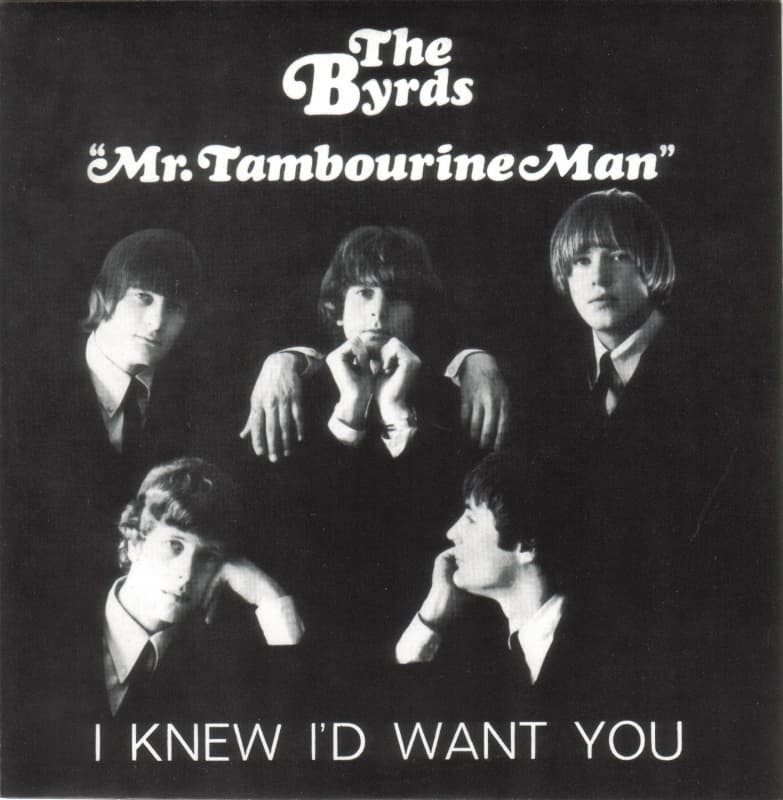
“Mr. Tambourine Man” – The Byrds’ Folk-Rock Masterpiece That Changed Music History
Released in 1965, “Mr. Tambourine Man” became a defining moment not only for The Byrds but for the entire folk-rock movement of the 1960s. Originally written and recorded by Bob Dylan, the song was already celebrated within folk circles, but The Byrds’ shimmering electric arrangement catapulted it to No. 1 on the Billboard Hot 100 and No. 1 on the UK Singles Chart. Their version marked a seismic shift in popular music, bridging the gap between folk storytelling and the jangly energy of rock ‘n’ roll.
The Byrds took Dylan’s introspective lyrics and gave them new life, weaving them into a lush tapestry of chiming 12-string guitar, smooth harmonies, and pop sensibilities. Where Dylan’s version was a wandering, poetic meditation accompanied only by an acoustic guitar and harmonica, The Byrds transformed it into a compact, radio-friendly hit. The track’s jangling guitar riff—played by Roger McGuinn on a Rickenbacker 12-string—became an instantly recognizable sound that defined much of the band’s early work and influenced countless other musicians. McGuinn’s guitar sparkles like sunlight on water, creating an ethereal, dreamlike texture that complements the song’s lyrical themes of escape and freedom.
“Mr. Tambourine Man” is a song about seeking refuge in art and imagination, with the tambourine player representing a guide through a kind of emotional or mental journey. The lyrics evoke surreal, dreamlike imagery: “Take me on a trip upon your magic swirlin’ ship / My senses have been stripped, my hands can’t feel to grip.” Dylan’s words hint at longing for release from the burdens of daily life, a sentiment that resonated deeply with listeners in the mid-1960s, a time of growing social unrest and cultural experimentation. The Byrds’ soaring harmonies and buoyant instrumentation emphasize this sense of escape, giving the song a more uplifting and hopeful tone than Dylan’s original.
When The Byrds released the single in April 1965, it was an instant hit, paving the way for a new genre: folk-rock. The genre fused the lyrical depth of folk music with the upbeat, accessible sounds of rock, appealing to a broader audience while maintaining a sense of artistic authenticity. The success of “Mr. Tambourine Man” also played a pivotal role in influencing Dylan himself to go electric just a few months later, leading to his own transformation and the eventual release of Like a Rolling Stone.
While the entire band contributed to the sound of “Mr. Tambourine Man,” Roger McGuinn’s lead vocal performance was essential to its success. McGuinn’s distinctive voice—part folk troubadour, part rock star—added a touch of warmth and vulnerability to the song. David Crosby and Gene Clark provided the lush backing harmonies that gave The Byrds their signature sound, evoking a sense of camaraderie and collective longing. The band’s polished approach made the track appealing to mainstream radio, helping it resonate with a young audience eager for new sounds and ideas.
The release of “Mr. Tambourine Man” was more than just a commercial success—it signaled a cultural shift. Folk music, previously confined to coffeehouses and protest circles, found its way onto the pop charts and rock radio stations, opening doors for artists like Simon & Garfunkel and Joni Mitchell. It also solidified The Byrds’ position as one of the most influential bands of the 1960s, inspiring a wave of musicians to explore the intersections of folk and rock music.
In the years since its release, “Mr. Tambourine Man” has remained a cornerstone of both The Byrds’ discography and 1960s music as a whole. Its dreamy, otherworldly quality still captivates listeners, while its themes of liberation and self-discovery feel as relevant today as they did nearly sixty years ago. Whether played at full volume through a car stereo or discovered quietly in a nostalgic playlist, “Mr. Tambourine Man” invites listeners to lose themselves in a world of music and imagination—a place where the tambourine man is always ready to lead the way.